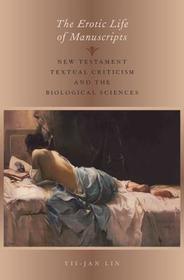
The Erotic Life of Manuscripts
New Testament Textual Criticism and the Biological Sciences
-
10% KEDVEZMÉNY?
- A kedvezmény csak az 'Értesítés a kedvenc témákról' hírlevelünk címzettjeinek rendeléseire érvényes.
- Kiadói listaár GBP 97.00
-
46 341 Ft (44 135 Ft + 5% áfa)
Az ár azért becsült, mert a rendelés pillanatában nem lehet pontosan tudni, hogy a beérkezéskor milyen lesz a forint árfolyama az adott termék eredeti devizájához képest. Ha a forint romlana, kissé többet, ha javulna, kissé kevesebbet kell majd fizetnie.
- Kedvezmény(ek) 10% (cc. 4 634 Ft off)
- Kedvezményes ár 41 708 Ft (39 722 Ft + 5% áfa)
Iratkozzon fel most és részesüljön kedvezőbb árainkból!
Feliratkozom
46 341 Ft

Beszerezhetőség
Megrendelésre a kiadó utánnyomja a könyvet. Rendelhető, de a szokásosnál kicsit lassabban érkezik meg.
Why don't you give exact delivery time?
A beszerzés időigényét az eddigi tapasztalatokra alapozva adjuk meg. Azért becsült, mert a terméket külföldről hozzuk be, így a kiadó kiszolgálásának pillanatnyi gyorsaságától is függ. A megadottnál gyorsabb és lassabb szállítás is elképzelhető, de mindent megteszünk, hogy Ön a lehető leghamarabb jusson hozzá a termékhez.
A termék adatai:
- Kiadó OUP USA
- Megjelenés dátuma 2016. január 28.
- ISBN 9780190279806
- Kötéstípus Keménykötés
- Terjedelem224 oldal
- Méret 236x157x22 mm
- Súly 431 g
- Nyelv angol
- Illusztrációk 1 illus. 0
Kategóriák
Rövid leírás:
The Erotic Life of Manuscripts explores the curious relationship between the field of New Testament textual criticism and the biological sciences, beginning in the eighteenth century and extending into the present.
TöbbHosszú leírás:
Since the New Testament's inception as written text, its manuscripts have been subject to all the dangers of history: scribal error, emendation, injury, and total destruction. The traditional goal of modern textual criticism has been to reconstruct an "original text" from surviving manuscripts, adjudicating among all the variant texts resulting from the slips, additions, and embellishments of scribal hand-copying. Because of the way manuscripts circulate and give rise to new copies, it can be said that they have an "erotic" life: they mate and breed, bear offspring, and generate families and descendants. The Erotic Life of Manuscripts explores this curious relationship between the field of New Testament textual criticism and the biological sciences, beginning in the eighteenth century and extending into the present.
New Testament textual critics who used language to group texts into families and genealogies were not pioneering new approaches, but rather borrowing the metaphors and methods of natural scientists. Texts began to be classified into "families, tribes, and nations," and later were racialized as "African" or "Asian," with distinguishable "textual physiognomies" and "textual complexions." These genealogies would later be traced to show the inheritance of "corruptions" and "contamination" through generations, an understanding of textual diversity reflective of eighteenth- and ninteenth-century European anxieties over racial corruption and degeneration.
While these biological metaphors have been powerful tools for textual critics, they also produce problematic understandings of textual "purity" and agency, with the use of scientific discourse artificially separating the work of textual criticism from literary interpretation. Yii-Jan Lin traces the use of metaphors and methods from the biological sciences by New Testament textual critics to show how the use of biological classification, genealogy, evolutionary theory, and phylogenetics has shaped--and limited--the goals of the field, the greatest of which is the establishment of an authoritative, original text. The conclusion of this study proposes new metaphors for the field.
With her research, Lin has provided a valuable service to New Testament textual criticism. With the benefit of this outside analysis, the hope is for an increased self-awareness within the discipline that seeks opportunities to shed any restraint imposed by the adopted biological metaphor and to leapfrog into new theories and methodologies of its own.
Tartalomjegyzék:
Acknowledgments
Introduction
Part I: Collection and Theorization
Chapter 1: Bengel and the Classification and Racializiation of Texts
Chapter 2: Lachmann and the Genealogy and Corruption of Texts
Part II: Historicization and Innovation
Chapter 3: Darwin, Streeter, and Narrative Textual Criticism
Chapter 4: Philology and Phylogeny
Conclusion
Appendix 1: Excerpt of Interview with Gerd Mink and Klaus Wachtel, Institut für Neutestamentliche Textforschung, Münster, March 10, 2011
Appendix 2: "Marcus Niebuhr Tod," by Maurice Bowra
Bibliography
Index




